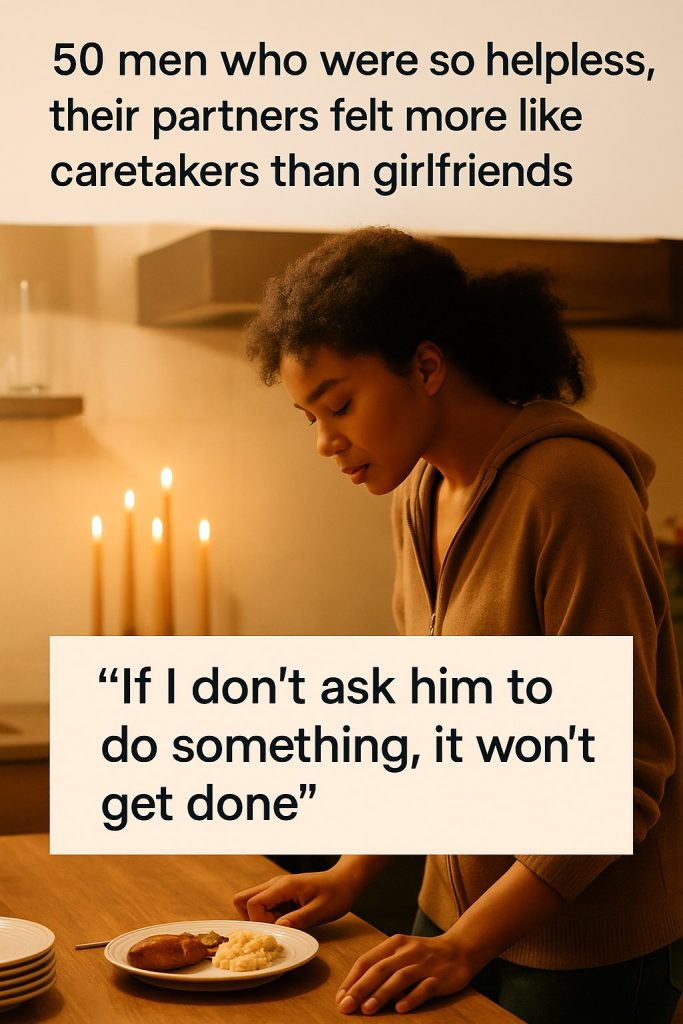In recent months, a viral social media trend has drawn attention to a phenomenon many couples quietly experience but rarely discuss publicly: men so helpless in daily responsibilities that their girlfriends feel more like caretakers than partners. The conversation, sparked by a popular online list titled “50 Men Who Were So Helpless Their Partners Felt More Like Caretakers Than Girlfriends,” has resonated widely in 2024, igniting discussions about relationship dynamics, gender roles, and emotional labor.
The list, which surfaced on various social platforms earlier this year, describes men who exhibit such a high level of dependency on their partners for everything from household chores to emotional support that maintaining the relationship becomes exhausting for the women involved. One striking comment frequently repeated encapsulates the issue: “If I don’t ask him to do something, it won’t get done.” This recurring sentiment highlights the imbalance many couples face.
Experts who study relationship psychology note that while partnerships naturally involve support and cooperation, a significant disparity in basic life skills can provoke frustration and fatigue. In healthy relationships, mutual respect and shared responsibilities prevail, but these stories reveal scenarios where women inadvertently take on a caretaker role, which can strain intimacy and equality.
What makes this trend especially compelling is how it challenges traditional expectations. Often, cultural norms assume men should be the providers or at least equally capable in managing everyday tasks. Yet, the revelations in this viral phenomenon show a growing number of men dependent to the point of helplessness. Researchers suggest multiple factors could contribute to this, including overprotective parenting styles, societal shifts in gender roles, and a lack of encouragement for men to cultivate independence and self-sufficiency skills from a young age.
Some of the anecdotes shared online describe men unable or unwilling to handle simple responsibilities like doing laundry, cooking, or managing finances without constant reminders. Others point to emotional immaturity, where men rely heavily on partners for motivation or decision-making. The caretakers—typically girlfriends—express feelings of being overwhelmed, undervalued, and trapped in a dynamic that resembles parent-child more than romantic equals.
This discussion also shines a light on broader social conversations about emotional labor—the mental and physical effort one puts into managing a household and relationship. Women, who historically shoulder much of this burden, find themselves increasingly vocal about the toll it takes on their wellbeing when partners don’t contribute fairly.
Not all men fit this description, of course, and the trend is not universal. However, the viral visibility of such stories has sparked valuable dialogue about how couples negotiate roles in the modern era, encouraging men to develop more independence and actively participate in partnership duties.
Relationship coaches and counselors recommend open communication as a key step forward. Addressing these imbalances early and encouraging skill-building and shared responsibilities can prevent resentment. Additionally, promoting environments where men feel free and expected to learn and handle tasks without judgment can foster healthier, more balanced relationships.
Ultimately, the “helpless men” trend is less about assigning blame and more about recognizing an imbalance that affects many couples worldwide. As this conversation continues throughout 2024, it offers an important reminder: a nurturing partnership thrives on equality, respect, and shared effort—not caregiving or constant prompting.



